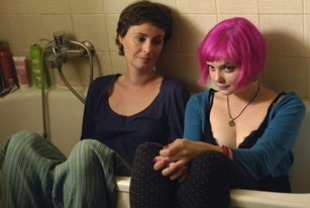Czech director Jan Hrebejk and screenwriter Petr Jarchovsky were the creative team behind Divided We Fall, an extraordinary film about four individuals in a small Czech town during World War II who show us the flaws and vulnerability of heroes in difficult straits. That film was an Academy Award nominee for Best Foreign Language Film of 2000. Hrebejk and Jarchovsky have come up with another deeply human and ethically thought-provoking drama about family and politics. It has won accolades and is the 2010 entry for the Best Foreign Language Film Oscar.
Pavel Josek (Martin Huba) is a highly touted university professor and former clinical psychiatrist who is being profiled in a Czech television documentary. Part of the reason for this honor is that he stood up against the tyrannical communist regime with great courage and dignity. His wife, Jana (Daniela Kolarova), is loyal to him; his daughter, Lucie (Lenka Vlasakova), depends upon his love and tenderness after her operation for the removal of a rare tumor; her daughter, Bara (Anna Simonova), looks to her grandfather for wise counsel after being caught for stealing.
The only person who is not captivated by Pavel's intellect, charm, and personal warmth is Ludek (Milan Mikulcik), Lucie's husband who's the son of a Communist. He feels that both of her parents look down their noses at him. Meanwhile, when his wife returns from the hospital, he and his former girlfriend, Radka (Petra Hrebickova), arrive for a talk with her about forgiveness and letting go, based on a spiritual book they have both read. Lucie is not impressed or convinced of their sincerity.
Kawasaki's Rose takes a sharp turn when director Hrebejk and screenwriter Jarchovsky have the documentary people discover a secret in Pavel's past that compels us, the audience, to plumb the nature of our feelings and principles about collaboration, torture, idealism, memory, and forgiveness. As a result of this startling turn of events, we are introduced to Borek (Antonin Kratochvil), a subversive sculptor living in Sweden, and Kafka (Ladislav Chudik), a former secret police interrogator.
This top-drawer character-driven drama is overflowing with soul-searching moments which elicit visceral audience responses to the barbarity of torture, betrayal, and the difficulty of the spiritual practice of forgiveness.
